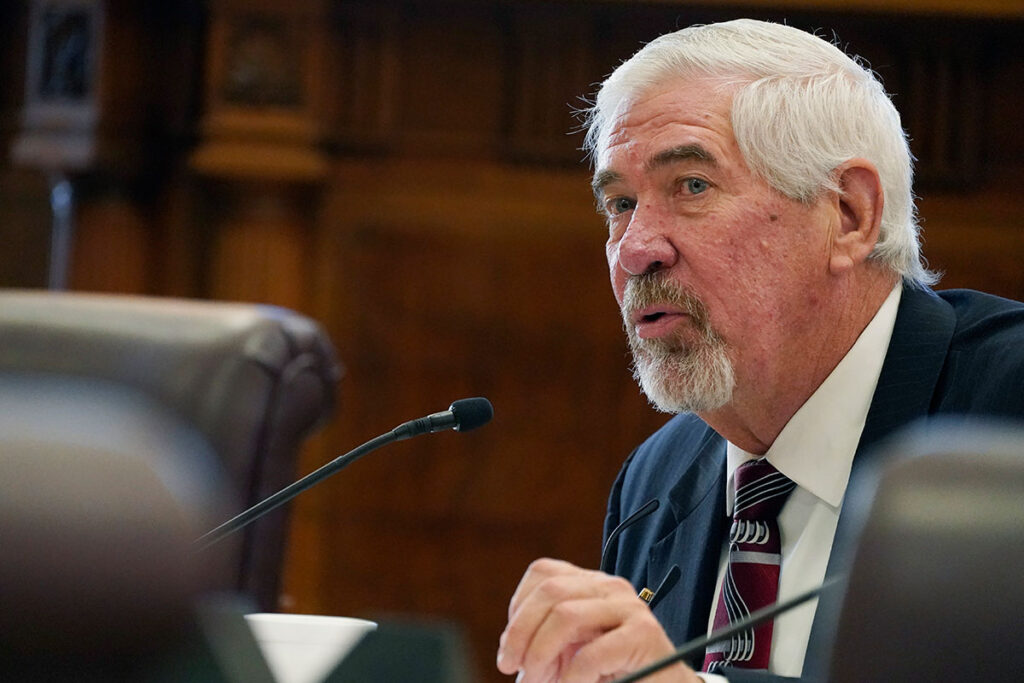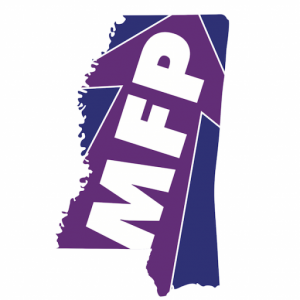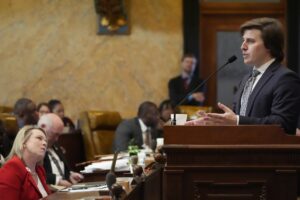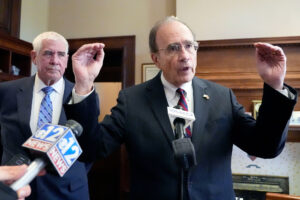All registered Mississippi voters could be able to cast a ballot up to 15 days before an election, including two Saturdays, under an early-voting bill the Mississippi Senate passed on March 12.
“Our state is one of only three in the nation not to offer in-person early voting, and it is time we change that,” Sen. Jeremy England, the bill’s Republican author, wrote in a March 4, 2024, op-ed for Magnolia Tribune. “This proposal can ensure Mississippians who are busy with work, school, or family commitments, as well as seniors, people with disabilities, and voters who live in rural areas will be able to cast their ballot on their schedule.”
The bill would end in-person absentee voting, a limited option that only some voters qualify for, in favor of the new universal early-voting option. Mail-in absentee voting would still be an option for some people, but the new bill would require any mailed-in votes to arrive by 7 p.m. on Election Day to be counted. A pandemic-era 2020 law, which state Republicans are challenging in court, allowed ballots to be counted if they arrived up to five business days after an election.
England told the Mississippi Free Press in an interview on March 12 that replacing in-person absentee voting with 15 days of early voting would “add to the integrity of” Mississippi’s elections. During the 2020 election, former President Donald Trump baselessly claimed that Democrats used early voting to “rig elections.” Those claims led to a deficit in Republicans voting early in states that offered it compared to Democrats. Since then, national Republicans—including Trump—have encouraged Republicans to vote early.
Under the proposal, voters would be able to cast a ballot until noon on the Saturday before the election, with extended hours during the last full week.
The GOP-led Senate passed the bill in a bipartisan 44-8 vote, with all no votes coming from Republicans. The Mississippi House must also approve the bill before it can go to Gov. Tate Reeves’ desk. If that happened, the governor could either sign the bill, allow it to become law on a deadline without his signature or veto it; the Legislature can override a veto with two-thirds votes from both chambers.
Potential Pitfalls for Medicaid Expansion Efforts
Efforts to expand Medicaid to more than 200,000 people in Mississippi are not over even after the Mississippi Senate allowed its version of an expansion bill to die on a legislative deadline on Thursday, March 14.
The House passed its version of a Medicaid expansion bill on Feb. 28, including work requirements. But if the Biden administration does not approve the work requirement, Medicaid expansion would still happen in Mississippi under the House version.
“The goal of the plan is to provide health insurance for working Mississippians,” Mississippi House Medicaid Committee Chairwoman Missy McGee, R-Hattiesburg, said last month. “We believe that at least 75-80% of this population is working, so we certainly don’t want to not help them just because we might be helping another population who might not be working or able to work at the time.”
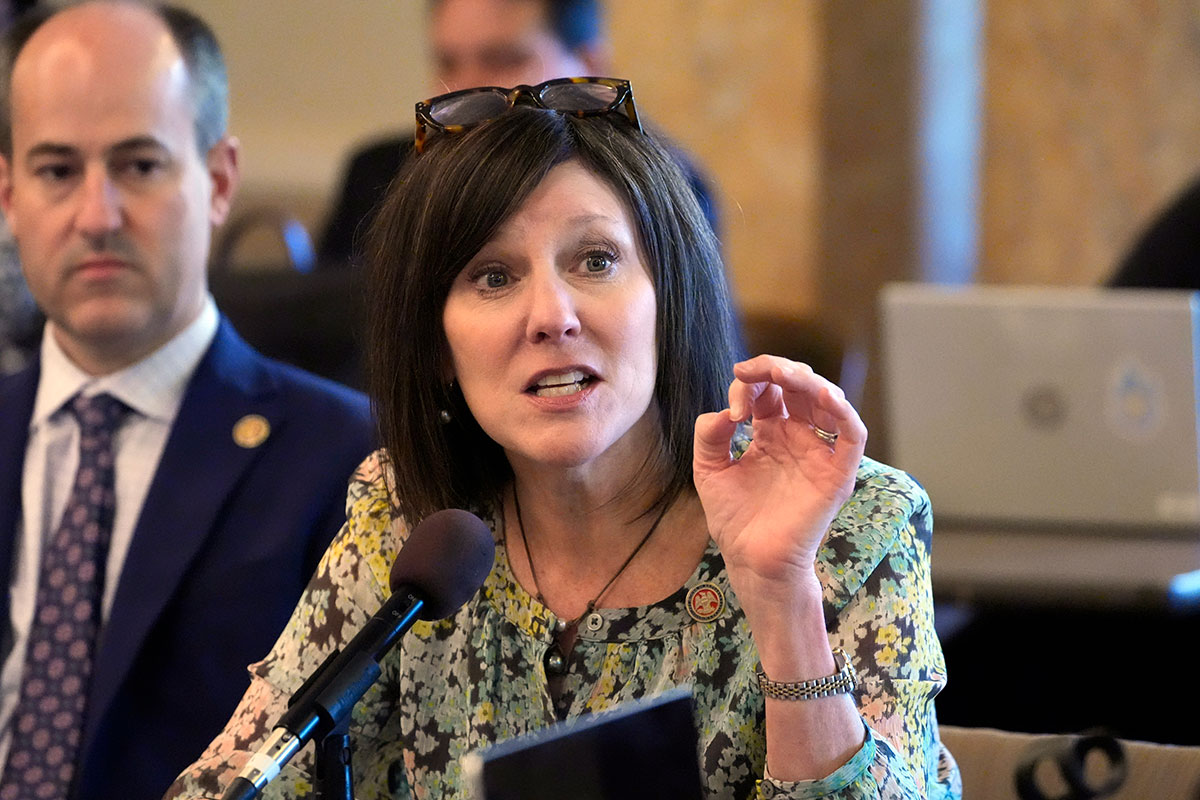
Senate leaders, however, have said they want to ensure any Medicaid expansion bill that becomes law would only take effect if the Centers for Medicare and Medicaid Services allows it to enforce work requirements. However, CMS and federal courts have previously declined to allow work requirements for expansion in other states, meaning it is possible that a Senate-style expansion bill could result in no expansion for anyone.
Senate Medicaid Committee Chairman Sen. Kevin Blackwell, R-Southaven, told Magnolia Tribune’s Sarah Ulmer on March 14 that the Senate will use a strike-all on the House Medicaid expansion bill, meaning senators will replace the House bill’s text with their own text.
After the Senate makes its changes, the expansion effort will likely go to conference, where Senate and House leaders would work out an agreement. But Gov. Tate Reeves has already said he will veto any Medicaid expansion bill that reaches his desk.
“I think we have to wait and see the bill, but I think the Governor is a reasonable individual, a smart man. I think he’ll be able to work through what we are trying to do,” Blackwell told Magnolia Tribune.
Fines for Unhoused People
Unhoused people could face thousands in fines under a bill the Mississippi Senate passed on March 12. Under the proposal, people who sit, lay, sleep or set up personal property on or within 1,000 feet of sidewalks, parks, roads, schools, libraries or residential facilities would have to pay a $1,000 fine. The bill defines the prohibited locations as “sensitive areas” and “critical infrastructure areas.”
The bill specifically targets unhoused people and says that multiple unhoused people living in an unsheltered area could not set up “homeless encampments,” including tents. City leaders could also deem “homeless encampments” as menaces to the public’s health and safety and remove them if they are on public property.
Before law enforcement could arrest a person for disobeying the law, they would have to provide a written notice 48 hours in advance in the person’s native language and share alternative housing options and mental-health resources. Law enforcement would have to give a 72-hour notice to evacuate “homeless encampments.”
“The removal of homeless persons or homeless encampments on private property shall be done in a humane manner,” S.B. 2500 says. “It is illegal to inflict harm on the trespassers or damage their personal property.”
The bill now goes to the House.
Procedures for Missing-Persons Investigations
Law enforcement agencies would have a list of procedures to follow when investigating a missing or unidentified person under Senate Bill 2268.
The bill says within 10 days of the police receiving a missing-person’s report, the police must register the person and their medical records in the National Missing and Unidentified Persons System and collect DNA from family members to submit to the Combined DNA Index System. If possible, law enforcement should collect fingerprints from the missing or unidentified person and submit them to the National Missing and Unidentified Persons System, the bill says.

S.B. 2268 says that law enforcement officers must begin working on the missing-person’s case as soon as they collect “reliable information” that a person is missing. A person’s next of kin would not have to report to the police to initiate a missing-person’s investigation under the bill.
“A law enforcement agency shall not establish or maintain a policy that requires the observance of a waiting period before accepting and investigating a report of a missing child,” S.B. 2268 says.
The bill would also require county medical examiners to enter any unclaimed human remains cases into the national database within five days of identification of unclaimed remains.
Hinds County drew national attention recently after a mother said she searched for her son, Dexter Wade, for months—including reporting him as missing—only to learn that he had died months earlier and county officials had buried him in a pauper’s field for unclaimed bodies despite identifying him. After Bettersten Wade’s story became national news, multiple other families came forward telling similar stories or learned of loved ones who had died and whom Hinds County officials had buried without their knowledge.
Free Museum, Park Admission for Foster Kids
Children in the foster-care system and their family members could get into publicly funded museums and state parks for free under Senate Bill 2244.
The bill also applies to children under 21 who are either in the legal custody of the Mississippi Department of Child Protective Services, live in residential child-care agencies or were adopted out of foster care.
The Senate passed S.B. 2244 on March 12; it heads to the House for consideration.
Private School Voucher, IVF Protection Bills Die
Other legislative efforts advanced and some died by the March 12 deadline. Here are some of those.
- An effort to merge Mississippi University for Women into Mississippi State University died on deadline. But the Senate did send a bill to the House to create a work-study group to decide whether Mississippi should close some of its eight public universities.
- A universal voucher bill that would have allowed state public education funds to be spent sending children to private schools died in the House on March 14.
- An effort to protect in-vitro fertilization in Mississippi died on deadline without a vote on March 14.
- Hunters could soon have the option of wearing fluorescent pink instead of neon orange after the House and Senate approved House Bill 526.
- Officials could not select locations that sell alcohol as polling places under a bill the House passed on March 12.
- An effort to restore the ballot initiative with some restrictions on what voters can put on the ballot passed the Senate on March 14, but key differences between the two chambers remain.
Shaunicy Muhammad contributed to this report.


